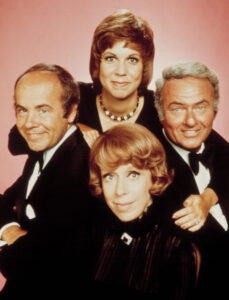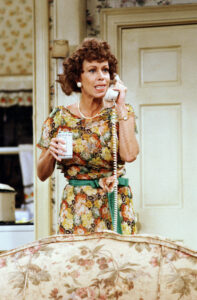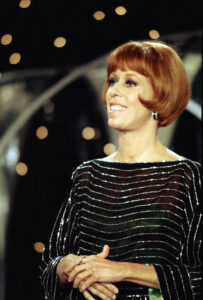For more than a decade starting in 1967, Carol Burnett and a cast of funny friends – including Harvey Korman, Vicki Lawrence, Tim Conway and Lyle Waggoner – created a variety show that would become an icon of American television.
With a familiar tug on her ear, The Carol Burnett Show’s skits featuring memorable characters and hilarious sendups of everyday life – like zany dentist offices – and movie parodies, like Gone With the Wind, became immediately recognizable parts of our country’s comedy lexicon through decades of syndicated broadcasts.
Now, PBS Wisconsin is pleased to bring a collection of the show’s original episodes, personally picked by Burnett, to this fall’s Saturday night lineup, starting at 6 p.m. Saturday, Oct. 3.
“I’m really thrilled, because you are showing the full hour,” Burnett said in a recent PBS Wisconsin interview from her California home.
Curating the selection of episodes that we will enjoy on PBS Wisconsin offered a chance for Burnett to reflect on her favorite memories from the series.
Viewers will quickly remember the seamless camaraderie of a comedic cast who had never worked together but seemed like they were made for each other.
And, after being a regular presence on PBS Wisconsin in recent years, in the Pioneers of Primetime series, as a recipient of the Mark Twain Prize for American Humor and as a feature of an American Masters film on her life, Burnett – a self-admitted PBS viewer and fan – said she is excited for viewers to enjoy the series that cemented her legacy as a master comedian.
“I am just thrilled,” Burnett said. “Give everyone in Wisconsin my love. Stay safe and healthy!”
Read our full Q&A conversation with Burnett below, with more beloved memories, fun stories about her cast mates, her close connection to Lucille Ball, what she has been doing to fill her time during the pandemic, and how she is looking forward to visiting Wisconsin with her one-woman show next year.

Tim Conway, Vicki Lawrence, Carol Burnett, Harvey Korman, 1967-1979
PBS Wisconsin: We’re so excited to be able to bring The Carol Burnett Show to our public television audiences here in Wisconsin – and when they tune in, they’ll be seeing the full one-hour episodes, some for the first time since their original broadcasts.
Carol Burnett: Well, that’s really thrilling for me because, you know, we had a lot of music on our show. Everyone knows we had a lot of movie take off, you know, but we also had so much original music and so forth. And, when we went into syndication all those years ago, they cut out all the music.
PBS Wisconsin: Right. You had to shorten them to 30 minutes.
Carol Burnett: Yes. They just showed the sketches, you know, at the half hour. But there was so much more to our show than that. So, this is really thrilling for me.
PBS Wisconsin: I know that the shows that we’re going to be sharing are billed as “Carol’s Favorites.” I was curious, when you look back at the run of the series, what are the favorite moments that stand out for you most?
Carol Burnett: Oh, my gosh. That’s. There are so many you see iconic. You know, when we did Gone With the Wind. But there’s also, for me, all the movie take-off parodies that we did. I really enjoyed doing those and doing Mrs. Wiggins and Mr. Tudball. And, of course, the family, you know, with Eunice and Mama and Ed. All of those mean a lot to me.
There are also just special guests that we had. Roddy McDowall was a favorite of ours, and Steve Lawrence, and Bernadette Peters, and Ken Berry and so many others. Also when we did our show and we had musical guests on, whether or not it was a dancer or a singer, like Chita Rivera, or we had Gwen Burton, what we did is that I always liked to put those guests in to some of the sketches that we did. And they really enjoyed it.
Steve Lawrence was one of my favorites because not only could he sing beautifully, but he was very, very funny at the movie take-offs we did. With Stevie, we did Postman Always Rings Twice, Double Indemnity, African Queen, Laura, Gilda – all of those Stevie was in. And one time, he and his wife Edie were in the airport, and it was when the show was syndicated, and these teenage girls ran up to him and said, “You’re that funny guy on the Burnett show.” They had no idea that he sang.
PBS Wisconsin: The core of the show was how well the cast worked together. As you were building the cast for this show throughout its run, did you have any idea as you were putting that together how brilliantly everyone would gel together like they did?
Carol Burnett: No, but I had high hopes. You never know. But, I remember when first we were going to do the show, we kept saying we need somebody like a second banana. Only I don’t like that term, second banana, because to me, they’re always actually top banana. But for instance, when we were going to do the show, I knew I had to get a sidekick, the way Carl Reiner was to Sid Caesar and the way Art Carney was to Jackie Gleason, you know. So, Harvey Korman had been on The Danny Kaye Show and I admired his work tremendously. When Danny’s show went off the air and we were going to go on the air that following September, we kept saying we need a Harvey Korman. Then the penny dropped and we said, “Why don’t we get the Harvey Korman?” And, so I remember we put a call in to his agent, but I ran into him in the parking lot at CBS one afternoon and I think I practically bent over the hood of a car. I said, “You’ve got to be on our show.” And, so he signed up.
And then, Carl Reiner, actually, who’s a friend, suggested that we get a good-looking fun announcer to also be part of the cast. So we auditioned for all these good-looking guys. Lyle Waggoner came in, and of course he was beautiful, but he was also funny. He had a great sense of humor. So, there was no question there.
And then Vicki Lawrence, I got her after she wrote me a fan letter.
She was 18, graduating from high school, and she wrote this very intelligent letter to me and she enclosed a newspaper article with a picture of her. She was going to be in a contest for the title of Miss Fireball of Inglewood, California. And, so I look at the picture in the paper, and she looked more like me at 18 than I did. At the moment, we were planning on doing a recurring sketch where Harvey and I would be a married couple, and we’d be raising my kid sister.
So, I read the letter, and then I’d looked at the date for the Miss Fireball contest, and it was the same day I got the letter. Oh, wow. And I thought all this is some sort of an omen. So, my husband, who was executive producing the show, came downstairs and I said, “Don’t get too comfortable. We’re going to go see the Miss Fireball contest.”
We went, and she won the contest! That was in January of 1967, and we were going to go on the air in September. I said, well, we’ll be in touch. That summer, we auditioned her and another girl.
Now, Vicki had had no major experience at all. She was just out of high school. And this other girl was very good. But there was something about Vicki that spoke to me, so we took the chance, and we hired her. Now, I have to say today, that would never happen with a network. No network would allow that now.
At first, Vicky was very shy and quiet. She really learned in front of 30 million people a week. Harvey was so sweet to her; he took her under his wing, and he taught her accents. He taught her how to work with props and how to listen, not just to wait for your cue for the next slide but to be ready. And we were right – it just worked. Oh, my gosh. She started out as my kid sister and wound up being my mother. Who knew, right?
PBS Wisconsin: I know that Tim Conway started as a guest star. And, despite the comedic bond that he and Harvey Korman had, they surprisingly didn’t really know each other before the show, right?
Carol Burnett: That’s correct. Yeah. I think they knew of each other, but they didn’t really know each other. We were just so lucky. We were fortunate. It just sounds Pollyanna-ish, and maybe it is but we loved each other. And I think it showed that we did. We also had so much fun. We ran it like as if we were doing Summerstock. In other words, we would take an hour and 15 minutes – we go over time a little bit because I would do Q&A – in front of a studio audience with all the sketches, all the costume changes, all the scenery, all the music, everything. We’d be out of there in two hours. So, in other words, the studio audience that we had, they were watching a little Broadway mini musical revue. I had been at tapings for sitcoms that are only 22 minutes long that take five hours to tape. It’s just ridiculous. But, we did it like much of a live show as we could.
I used to have a bet with the stagehands that I could do a skin-out costume change faster than they could move the couch across the room. I did not want to keep the audience waiting. So, there were times when a microphone might dip into the screen, into the shot. We wouldn’t stop. We just kept on going. I think that’s another reason why our show holds up, because you think it’s live. You know that we never broke up into laughter on purpose. Ever, ever. But, Tim was the culprit most of the time. We did two shows on Friday with two different audiences. The first show we would do, Tim would do it just the way we’ve rehearsed it, right to the ink.
Then he would go to the director after that, before the second show, he would talk to the director and say, “Did you get all the shots in the first show? OK, good.” Then he would say, for instance, “Ok, in the hotel room sketch, when I go over to the window instead of being on a shot from my waist up, be on me from head to toe.” That’s all he would say. The director would have to wing it because Tim would be coming up with some stuff that he never did in the first show.
I would say 90 percent of the time we would you go with what he came up with because it was perfect. The only reason we didn’t have him on every week right away was he was doing other stuff. But, we had him on. People thought he was a regular because we would have him on as often as maybe twice a month.

Carol Burnett as ‘Eunice’ in the ‘Mama’s Family’ sketches, 1967-78
PBS Wisconsin: You mentioned each show starting with a Q&A, which has become an iconic part of the series. I know that before the COVID-19 pandemic hit, you were on the schedule to come visit here in Wisconsin for one of the live Q&A shows that you are still doing. Have you visited our state before?
Carol Burnett: Yeah, a long time ago. And, I’m just sorry. Oh, my God. I mean, for everything, for the world, of course. But, I miss going out. I would do 90 minutes of Q&A, and I’d show some of my favorite Q&As that we did on the show to get the audience used to what we would be doing. There were never any plants in the audience – it was all adlibbed. I never knew what anybody was going to ask. I would just call on them. “Ok, the lady in the second row in the pink blouse. What do you want to say or ask?”
PBS Wisconsin: After so many years of taking questions from audiences, do you ever still get surprised?
Carol Burnett: Occasionally. (Laughing.) Yeah. I get a lot of the same questions, of course, “Was Tim Conway that funny in real life?” And, then I have some stories about him. And, I have stories like I told you about Vicki and how we got Harvey. How do you do the Tarzan yell? Why did you pull your ear, and stuff like that. But, then I’m always happy when I get something I haven’t been asked before.
PBS Wisconsin: We’re bringing The Carol Burnett Show here to PBS Wisconsin audiences. In recent years you you’ve already been a regular part of the PBS family. You received the Mark Twain Award. You’ve appeared on the Pioneers of Primetime series. And, of course, the fantastic American Masters film. So outside of the shows that feature you, are you a PBS watcher also?
Carol Burnett: Oh, yeah. Oh, gosh. I’m just so proud. I’m really thrilled to be a part of this.
PBS Wisconsin: How have you been coping with the pandemic, the changes in the entertainment industry and keeping yourself busy during the days?
Carol Burnett: Well, actually, I am so grateful. I wake up in the morning and, here it is, Groundhog’s Day again. And, I have to bring myself up short and say, “Wait a minute. You are so fortunate, because I have a roof over my head and food on the table.” My heart breaks for most of the country that is suffering mightily from this horrible thing.
So, my husband and I, we watch good old movies and do crossword puzzles and I’m taking care of my grandson now. I’m thinking of writing again. I’ve written four books, and I’m thinking of doing a treatment on a place that I lived when I first went to New York when I was young, called the Rehearsal Club. There were 25 young women who wanted to be in the theater. It was sponsored by some wealthy ladies in New York, so that the rent was only $18 a week for room and board. This was in the 1950s. I had four roommates – there were five of us – in one big room and one closet, one bathroom for five women. Each one of us was different, but we would go to auditions. I think there’s a treatment there to be made. And, you know, if everything goes well, lately, they’ve been doing a lot of television featuring women, and this would be for that. It’s a period piece, because it will take place in the ’50s and there could be a lot of music and comedy. It was a wonderful place to be. I had a part-time job, and then I would go on the rounds to try to get an agent. I went through all of that, being turned down for things and still, you know, having the fire in the belly and not really getting too discouraged.
I remember one time I was up for a small role. It came down to another girl and me, and I really thought I had it. But I didn’t. She got it. But, what saved me was I thought, “Well, you know what? It’s her turn. It’s not my turn yet. My turn will come. But it’s her turn.” And, I never got discouraged because I had that attitude.
PBS Wisconsin: To hear you go back and talk about your early formative years, and to have that wisdom, I’m reminded of the acceptance speech that Ellen DeGeneres gave this year at the Golden Globes when receiving the Carol Burnett Award. She had such effusive praise for how influential you were then many, many years later in the development of her career. Who are the people who influenced you early in your career?
Carol Burnett: When I was at UCLA, I was in a class for musical comedy. There were about nine of us in the class. So, I was going to do a scene for my final exam from Annie Get Your Gun. The professor said that he and his wife were going to a party in San Diego, a black-tie affair, and he said, “Why don’t you kids come down, and you’ll be the entertainment at the party. I’ll grade you on your performance there.” So, we all went down to San Diego. And I did my scene from Annie Get Your Gun.
I’m at the hors d’oeuvres table, stealing hors d’oeuvres, putting them in a napkin to take home to my grandmother, putting them in my purse, and there’s a tap on my shoulder. I thought, “Oh my God, I’m busted.”
It was this gentleman and his wife. He’s in a black tie and she’s in a beautiful gown. He said he really enjoyed what I did. I thanked him, and he said, “What do you want to do with your life?” I said, “Well, someday I’m hoping I can afford to go to New York because I want to be on the stage like Ethel Merman and Mary Martin.
He said, “Why don’t you go now?”
I said, “Well, I’m saving up.”
And, he said, “I’ll lend you the money.” And, he did. I thought maybe it was the champagne talking, you know? And his wife said, “No, he means it.”
So, he had me come down to his office the following Monday, and he wrote a check out for $1,000. Now, our rent – with my grandmother, we were living in one room in an apartment building right off Hollywood Boulevard – our rent was $30 a month, and we could hardly pay that. A thousand dollars was like a billion.
He said, “There are stipulations. You must use this money to go to New York. You must never reveal my name. And, if you are successful, you must promise to help others out.” So, that that was an encouragement!

Carol Burnett
And, then my darling Lucille Ball. She came to see me when I was in my first off-Broadway show called Once upon a Mattress. She came to see me, and she came backstage afterwards. She called me “Kid.” And, she was so encouraging.
As she was leaving, she said, “Kid, if you ever need me for anything, you give me a call.”.
So about four or five years later, I was doing pretty well, and CBS was offering me an hour variety show if I could get a major guest star.
The producer said, “Carol, you got to call Lucy.”
I said, “I don’t want to bother her.” The producer told me that she said I should call.
“But, that was for four years ago!”
He said, “All she could do is politely say she can’t do it.”
So, I got up the nerve and I called her. She said, “Kid, you’re doing great! What’s cooking?”
I was stammering all over the place. “I know you’re busy. I know you can…”
She said, “When do you need me? I’ll be there.”
She always sent me flowers on my birthday. And, she gave me a baby shower, but it was a black tie affair with men and women! At the time, she was married to Gary Morton, who was a comedian. So, he opened all the baby gifts and was doing bits about each gift – it was one of the funniest evenings ever. As the men were leaving, they said, “We have no idea that a baby shower could be this much fun.”
But, that was Lucy.
In 1989, she died on my birthday. I got up that morning and turned on the news. She had died. And, I got the flowers from her that afternoon. “Happy birthday, kid,” the card said. She never forgot.
The Carol Burnett Show airs 6 p.m. Saturdays beginning Oct. 3.
 Passport
Passport









Sally Williams
Why were black actors called negros on your show Sammy Davis Junior Diane Carroll and others portrayed as not equal?
William Carr
Flannery O’Connor saw through Margaret Mitchell’s treatment of Old South history as a snow job for concealing deeper realities in her criticism of Gone With The Wind.
That movie was funded by John “Jock” Hay Whitney whose relative, Asa Whitney, promoted the Transcontinental Railway. The South’s Savanah to San Diego or Los Angeles trek across the advantages, flat, Great Southwest laid out by Jefferson Davis in the 1850’s was stalled by The Civil War fought not over the fastest route to the Pacific and China Trade (opium) that made the New England Brahmin wealthy, but over the more palatable and high-minded values of abolition vs. state’s rights.
Ninety percent of white Southerners were not slave owners nor Tara Plantation planters.
Like Flannery O’Connor, Carol Burnett decided to deconstruct the mythology in her?writers’ brilliant skit “Went With The Wind” and thoroughly disrobes the bamboozle using the power of comedy.
The part of Missy played by Vicki Lawrence could have been performed by Whoopi Goldberg, but not with the same effect.
Television in the 70’s and 80’s is a time capsule on U.S. culture and changing mores.
Carol’s good friend and mentor who had been married to Desi Arnez pioneered in her day what some Anglo-Americans considered a mixed-race marriage.
And so it goes. It’s always something and if it’s not one thing it’s another.